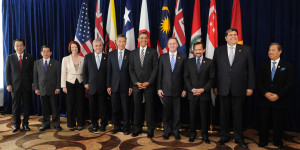The TPP and Japan: Abe’s Third Arrow Hits Its Mark
After five long years of arduous negotiations, twelve pacific nations signed the historic Trans-Pacific-Partnership deal on October 5, 2015. Japan’s participation in the free-trade agreement serves to bolster Japan’s economic position in the global economy and facilitates the accomplishment of the Prime Minister of Japan’s third arrow of the Abenomics initiative.

On top of bold monetary policy and fiscal stimulus, Prime Minister Shinzo Abe came to power promising massive structural reforms, sufficient to raise Japan’s growth rate to an average of 2 percent over the next 10 years. The new agreement, under which Japan agrees to numerous concessions, will allow Abe to dissolve Japan’s notoriously protected domestic industries and implement the promised structural reforms.
As part of these concessions, Japan promises to eradicate tariffs on 95 percent of items (8,575 of the 9,018 items) and meet a precisely-delineated import quota. Japan’s agreement to these unprecedented measures conveys a determination for promoting the development of future regional bilateral agreements.
These stipulations opened the door to opportunities for the rejuvenation of Japanese industries that suffered throughout the economic stagnation of the so-called “lost decades.” Easing of regulations will facilitate foreign direct investment and expansion to foreign markets. Furthermore, the industrial sector will gain access to intermediate inputs in technology and automotive production sectors at cheaper prices. These drastically cheaper inputs coupled with the severe reduction of tariffs in signatory countries mean Japanese firms can both increase their production output and exports into lucrative markets such as the U.S., Singapore, and Malaysia.
Despite this deluge of economic promise, opposition coalition of agricultural leaders and farmers is rapidly proliferating and gaining ground throughout the country. The contention between lawmakers and the agricultural sector stems from the virtual abolishment of tariffs on domestic vegetable, dairy, meat, and other goods. While this measure will allow consumers to purchase cheaper and more competitively priced imports, many critics in the agricultural sector fear that it will result in the destruction of the domestic agricultural industry.
The domestic agriculture industry in Japan has historically enjoyed immense benefits from legislative measures that excluded competitive exports by setting high tariffs and providing government subsidies, especially in the “five sacred” industries: rice, wheat, beef and poultry, dairy products and sugar. Consequently, the domestic agriculture industry exports only a minuscule 5% of its total output to foreign markets.
Lawmakers in Japan are becoming increasingly attentive to these concerns as the Diet’s deliberation on the TPP is slated for the end of this year or early next year. Since the creation of the Liberal Democratic Party (LDP) at the beginning of the post war period, the agricultural sector has served an integral role as the electoral and conservative backbone for the LDP.
Abe sought to mitigate this growing tension by announcing two strategic measures. First, Abe has selected Hiroshi Moriyama, the LDP head of the TPP committee, to become the next Minister for Agriculture, Forestry, and Fisheries. Second, Abe announced that government will create a specific bureaucratic office and budget to engender the competitiveness of Japanese firms abroad and provide an outlet for rural constituents to voice their concerns.
Aside from this opposition, the TPP has been widely lauded by the majority of the populace. According to a Kyodo News Poll, 58 percent of those polled expressed support for the TPP.
The TPP might finally secure Japan an opportunity to ascend from the prolonged stagnation that has characterized the Japanese economy for over two decades. It seems Abe’s three arrows may have just hit their mark
